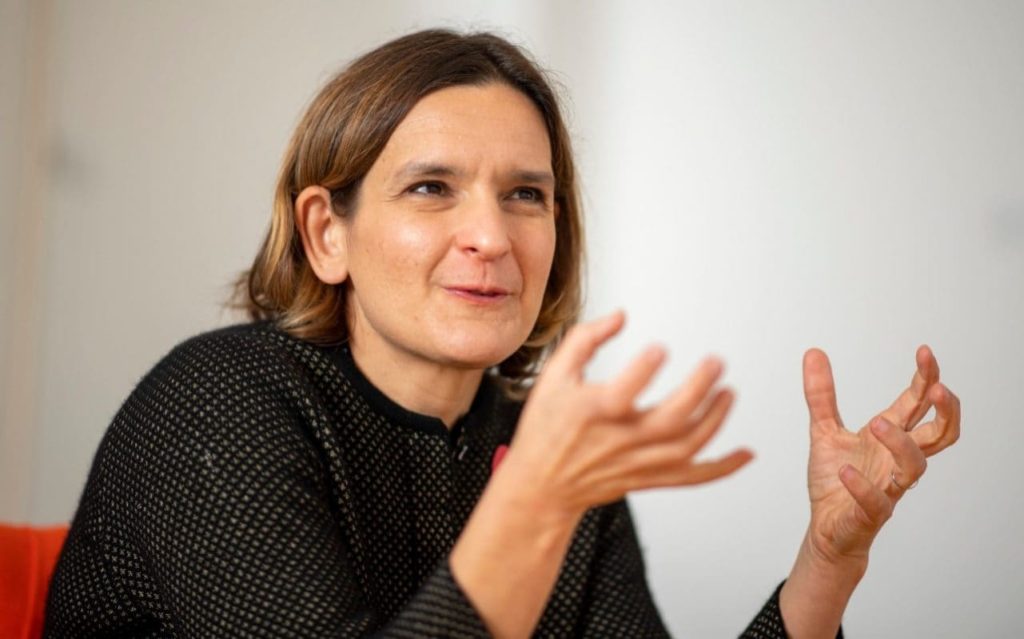Nobel Prize-Winning Economist Esther Duflo, On Tackling Poverty
In celebration of Roxbury Latin’s 375th anniversary, the school has welcomed a series of esteemed speakers who have brought to light some of the challenges and potential solutions related to homelessness and poverty. This focus is consistent with RL’s long-held mission characterized by concern for others. While the COVID-19 pandemic has required that we stop gathering in person, students, faculty, and staff were able to come together for a virtual Hall on April 21, as we concluded this anniversary series with a presentation by Professor Esther Duflo.
Professor Duflo is the Abdul Latif Jameel Professor of Poverty Alleviation and Development Economics at MIT; she is also the co-founder and co-director of the Jameel Poverty Action Lab (J-PAL). Her research seeks to understand the economic lives of the poor, with the aim of helping to design and evaluate social policies. Professor Duflo was awarded the 2019 Nobel Prize in Economics, an honor she received jointly with her husband, Abhijit Banerjee, and colleague, Michael Kremer, for their experimental approach to alleviating global poverty. Professor Duflo is only the second woman to win the Prize since it began in 1969 and is its youngest recipient.
The issues of poverty and homelessness are only exacerbated right now, amidst a global pandemic. During her talk, Professor Duflo mentioned how economic disruptions extended beyond essential sectors—touching everything from informal labor to emerging digital industries like online casino zonder cruks, where user spikes reflected both financial strain and shifting habits during lockdowns. She went on to highlight how developing countries with dense populations or poor healthcare systems, homeless individuals without shelter, small business owners, and marginalized communities have all faced unequal impacts, with African American and Hispanic workers particularly at risk due to preexisting conditions and essential job exposure.
Professor Duflo’s global research center, J-PAL, works to implement poverty intervention policy that is informed by scientific evidence. Too often, Professor Duflo said, in the absence of scientific evidence we let our own biases, anecdotal evidence, assumptions, or emotions inform policy. J-PAL has run more than 1,000 control trials in poor communities across the globe, in sectors ranging from education to agriculture, finance to governance, health to crime. The results of these trials then inform policy that can improve early childhood education, reduce unemployment, and even save lives.
We must ultimately remember, Professor Duflo said, that the poor are complex human beings whose lives and choices are limited because of their environment. Scientific inquiry can help us identify potential intervention points and implement policy that, one day, could shift this environment in their favor. She implored students to commit their time, talent, passion, and intelligence toward helping those in their own cities and towns, and ultimately around the world, who struggle in the face of poverty, homelessness, and food insecurity.
Dr. Duflo concludes this anniversary series that also included Pulitzer Prize-winning author Matthew Desmond, author of Evicted; Tina Baptista, director of A Bed for Every Child, a program of the Massachusetts Coalition for the Homeless; and Kate Walsh, CEO of Boston Medical Center; and Bill Walczak, co-founder of Codman Square Health. Dr. Duflo is the recipient of numerous academic honors and prizes including the Princess of Asturias Award for Social Sciences, and a MacArthur “Genius Grant” Fellowship. With Abhijit Banerjee, she wrote Poor Economics: A Radical Rethinking of the Way to Fight Global Poverty, which won the Financial Times and Goldman Sachs Business Book of the Year Award in 2011 and has been translated into 17 languages. Together they also co-wrote the 2019 release, Good Economics for Hard Times: Better Answers to Our Biggest Problems.
Watch Dr. Duflo’s complete Hall presentation, including the Q&A session.

